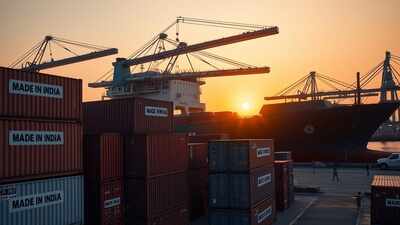ARTICLE AD BOX

India’s exporters have voiced deep concern after US announced steep new duties on Indian-origin goods, with production already grinding to a halt in major textile hubs.Several apparel manufacturers in Tirupur, Noida, and Surat have already stopped production as hefty tariffs loom. Starting 27 August, duties on multiple categories of Indian exports to the US will rise to as high as 50%The Federation of Indian Export Organisations (FIEO) said the decision would hit the country’s biggest export destination hard, with severe implications for jobs and competitiveness.FIEO President S C Ralhan said the development marks a major setback for India’s trade prospects. He warned that about 55% of goods headed to the US, valued at $47–48 billion, are now at a pricing disadvantage of 30–35%, leaving them unable to compete against rivals from China, Vietnam, Cambodia, the Philippines and other regional economies."FIEO expresses grave concern over the US government's imposition of an additional 25% tariff on Indian-origin goods - raising total duties on many export categories up to 50%, effective from August 27, 2025," he said. "Textiles and apparel manufacturers in Tirupur, Noida, and Surat have halted production amid worsening cost competitiveness," he further told PTI.Ralhan noted that Indian manufacturers are rapidly losing out to lower-cost suppliers in Vietnam and Bangladesh. He said that other labour-intensive industries, leather, shrimp, ceramics, chemicals, handicrafts and carpets, would also see their competitive edge erode, particularly against producers in Europe, Southeast Asia and Mexico.
"Delays, order cancellations, and negated cost advantages loom large on these sectors," he cautioned.The FIEO chief urged the government to step in with immediate relief measures, such as interest subvention schemes and export credit support, to help exporters manage working capital and liquidity. He said smaller firms especially need cheaper and easier credit access, backed by banks and financial institutions.
He also stressed the need for special directives from the government and the Reserve Bank of India, while also urging a one-year moratorium on loan repayments.Other remedies suggested include expanding PLI schemes, improving infrastructure, and investing in cold-chain and storage capacity. Ralhan also pushed for faster trade deals with the EU, Oman, Chile, Peru, the GCC, Africa and Latin American nations, with an early focus on labour-intensive sectors."However, leveraging the negotiating window for urgent diplomatic engagement with the US still remains the key. Yet another approach could be promotion of Brand India & Innovation through enhanced global branding, invest in quality certifications, and embed innovation in export strategy to make Indian goods more attractive globally," he told PTI.The exporters’ body has urged for swift, collective action to shield Indian businesses and workers from the shock of the tariffs."The steps taken now will determine how effectively India withstands external shocks and reasserts its presence in the global export landscape," Ralhan added.



.png)
.png)
.png)
















 3 hours ago
2
3 hours ago
2








 English (US) ·
English (US) ·